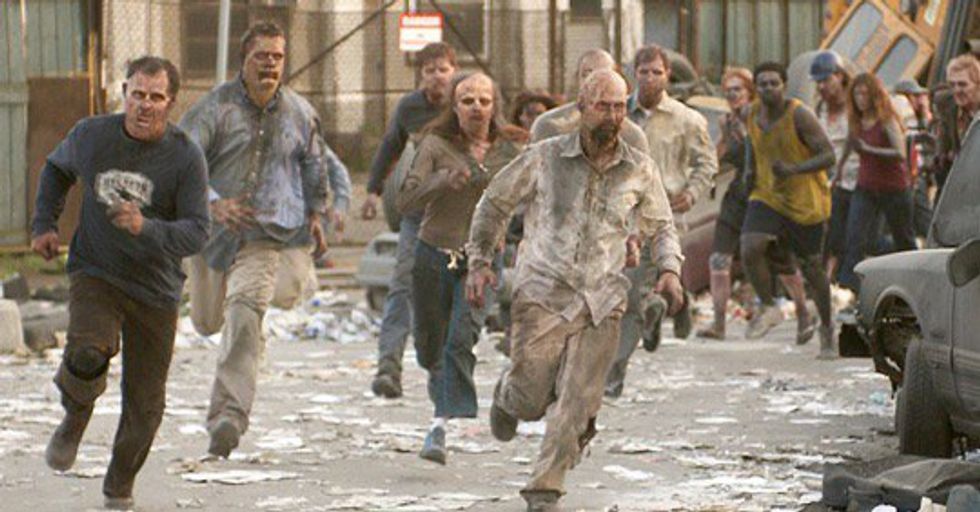Zombies seem to be the most complained about subgenre of horror media in modern society. It's a given that whenever a generic slasher film release is riddled with clichés and an overly familiar plot, not everyone will be happy. However, it seems that regardless of the quality surrounding the characters or plot of a zombie property, there are still those that remain despondently bitter. While franchises like AMC's popular television series "The Walking Dead" retain massive followings from year to year, I frequently hear comments of fatigue stemming from fans that feel the world of zombie texts is too crowded. Setting aside personal taste and the desire for original properties in media, I tend to disagree with comments that zombies are overdone or lack any pertinence in today's culture. To me, zombie texts, specifically video games, can serve as powerful critiques of modern society.
Obviously, zombies have a big role in film and arguably an even larger role in video games. Zombie texts have a very big presence in all of our popular culture right now. I've always found the obsession with zombies to be uniquely interesting in terms of the horror genre. For example, there's always that sense in slasher films that there's only one person. It's an isolated vignette of a protagonist that has somehow become the unlucky person being followed by someone else that wants to kill them and has no rationale or reason to want to do that. Zombies definitely do come from a different sort of mentality. I think George A. Romero, with "Night of the Living Dead" and even more so with "Dawn of the Dead," used those films to address a lot of social commentary. There was always that sense of an unstoppable, slow-moving, encroaching threat, and when you consider the period of time in which those movies were being made (the late 60's and early 70's), where communism was still this anxiety-ridden kind of thing, you had extreme racial tensions in the country and, of course, The Bomb. There was this sense that we were a lot closer to annihilating ourselves due to this warring between two superpowers than we have now. The idea of "There's this unstoppable and slow moving onslaught of the undead. Something bad is coming. We can't do anything about it, but it may take a while to get here."
Fast forward, post 9/11, you have "28 Days Later" and the remake of "Dawn of the Dead," both of which I think are exceptionally well made scary movies. This is when the concept of the fast-moving zombie suddenly came in. I think it was a psychological, social shift because the United States was moving from the "Cold War" mindset to the "terrorism" mindset. The idea suddenly became, "Something bad is coming, you won't know when, you won't know what's happening before it completely gets you." That anxiety permeates both of those movies and has permanently created a shift in the perception of zombie texts. Both films obviously feed a lot on a sense of powerlessness and the desire to survive. That's what I think is so interesting when you bring that over into an entirely different medium like video games. In the movies, obviously, it's a very passive practice and you're swept up in the horror of everything being presented to you, wondering "what would I do in that situation?" By contrast, I find it uniquely cathartic in video games when suddenly you're allowed to do something about it. I think games like "Dead Rising" really speak perfectly to feeding that kind of visceral need to slash through slow moving zombies, and then you look at something like "Left 4 Dead," utilizing the fast zombies, and it's definitely a more intense mode, and yes, you need to cooperate. All of these really play on a sense of survival and a fantasy a lot of people have that if things ever get really bad, all of our little quibbles and squabbles with one another will just fall by the wayside. Maybe we can all band together and we can go forward into a brighter future should the occasion were to ever arise.
One of my favorite games of all time, "The Last of Us," deals in a post apocalyptic setting brought on by an infection that strongly resembles zombie lore. However, the most chilling aspect of the story never comes from the monstrous hordes of infected that attack you, but rather from observing the downward spiral human morality takes when survival is at risk. Those themes are one of the reasons "The Last of Us" stuck with me for such a long time after playing. I sat for hours, raising questions about humanity's capacity to fall, becoming even worse than the animalistic, hyper-violent monsters I fought. Pairing this with the thought of whether or not a group of people could work together given the opportunity to fight back far exceeded my expectations for what interactive stories could do. It's remained one of the greatest joys I've experienced in gaming for years.
On a side note, a few years ago, I got the opportunity to take a trip to California. One night while we were visiting some friends in Los Angeles, we went to a bar called The Arsenal. No one in our group, even those that had been there before, ever questioned the bar's name the entire time we were there. Although, I distinctly remember at one point in the night that we all seemed to look up from our drinks at the same time and scan the walls, seeing an assortment of old guns and swords decorating the space above the bar. Almost immediately, we all said that if a zombie apocalypse were ever to take place, that bar would be the place we'd all want to go to.
That's cooperation. Thank you zombie games.























 sunrise
StableDiffusion
sunrise
StableDiffusion
 bonfire friends
StableDiffusion
bonfire friends
StableDiffusion
 sadness
StableDiffusion
sadness
StableDiffusion

 purple skies
StableDiffusion
purple skies
StableDiffusion

 true love
StableDiffusion
true love
StableDiffusion
 My Cheerleader
StableDiffusion
My Cheerleader
StableDiffusion
 womans transformation to happiness and love
StableDiffusion
womans transformation to happiness and love
StableDiffusion
 future life together of adventures
StableDiffusion
future life together of adventures
StableDiffusion





















